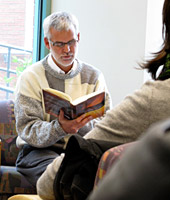SPU Library Gives the Campus 'Food for Thought'
The SPU Library invites the community to hear campus authors each week
Updated October 22, 2010
Posted November 9, 2009

By Hope McPherson [hmcpherson@spu.edu]
Photo by Melissa McCauley
Reminiscent of the French salons of the 17th and 18th centuries — where
intellectuals gathered to increase their knowledge — the Seattle Pacific University Library has been inviting faculty and staff authors to read to campus and community lunch-goers at Thursday Food for Thought.
Since the summer of 2008, the SPU Library has invited a wide range of campus authors to share from their latest publications. Each Thursday at 12:30 p.m., the Library Reading Room — nestled in the northwest corner of the building — morphs into a 21st-century salon. As the afternoon begins, the room fills with students, staff members, faculty members, as well as Seattle-area neighbors, and a campus author takes his or her place in a soft chair facing them.
During the 45 minutes to follow, those in the room are not only surrounded by the light pouring in from the tall windows, but they are also treated to a wide variety of topics and themes. “We wanted to invite the SPU community to come together in the Library to hear from the very talented faculty and staff writers we have here on campus,” says University Librarian Bryce Nelson. “Now in our second full year, Thursday Food for Thought is becoming a popular stop for our campus authors, as well as for the many people who come to listen.”
A full plate of offerings
Situated in the middle six weeks of each quarter, the readings have included everything from poetry to theology to baseball. Co-authors Professor of Psychology Les Parrott and marriage and family therapist Leslie Parrott dotted their time discussing their book Trading Places with personal stories — including one about a snow storm, a late-night flight, and an empty gas tank.
Associate Professor of Christian Ministry Jeff Keuss packed the room for his look at "Divine Cinema: Religion, Theology, and the Bible in Film. Director of SPU's M.F.A. program Gregory Wolfe and Instructor of English Suzanne Wolfe read from their book Bless This House: Prayers for Families and Children, drawing both laughter and tears from attendees. Response writer Clint Kelly sang "Food, Glorious Food" for his listeners during his reading from his adventure tale Delicacy. Jeffrey Overstreet, also a Response writer, has read from both a book about film and from his
Auralia Thread fantasy series.
Not surprising, several books have been award-winners or garnered national prominence. Associate Professor of English Jennifer Maier read from her award-winning poetry collection Dark Alphabet. Robert Clark, faculty member in SPU's M.F.A. in Creative Writing program read from his Washington State Book Award-winner Dark Water. John Medina, director of SPU's Brain Center had standing-room-only for his reading from his best-seller Brain Rules.
"I love how, through a variety of voices, Food for Thought captures something challenging and provocative every time," says Kelly. "I can sit there, listen, enjoy my lunch, and know my soul is being fed as well as my stomach.”
Now at the mid point of Autumn Quarter 2009 offerings, Thursday Food for Thought will welcome President Philip Eaton on November 5, who'll
discuss "The Christian University: The Place Where World Change Begins." Stephen Michael Newby and John Terrill follow in the quarter's final two weeks. But not to worry. The Winter Quarter lineup, adds Nelson, is already coming together with faculty and staff authors.
Says Professor of New Testament Jack Levison, who read from his new book Filled With the Spirit, "At Food for Thought, the boundaries of our institutional life became porous for 45 minutes, and we all listened, learned, and talked together. That is the genius of a university, and that genius transpired precisely where it should have — in the Library, the symbolic and actual center of our inquiry."
Return to Response |